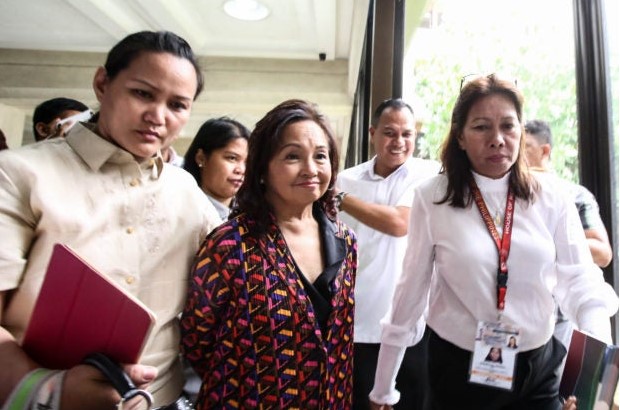Last Friday, the COMELEC went ahead and did what a lot of people have only said they were going to do: bring the former President to court to account for her actions.
Let’s not forget that, shall we, in the rush to equivocate.
But equivocating it seems, is something the sphere of public discussion is particularly adept at. Whether it’s because of a perfectionist tendency – where we cannot abide even imagining that there might be fly in the ointment – or because of an overly developed affinity for a certain style of doing things, I truly have no idea. But many times, this sphere of public discussion (for the sake of brevity, may I just call it “the aether?”) has shown itself to be a very fickle lady, vacillating from one extreme of opinion to the other. At first, it’s like “Yay! Manny won!” but then it’s like “Boo! He should’ve lost!”
Well, last Friday, we started with yay! and now, it appears we’re at “Why did you do it in such haste?”
The word “haste” has a bad reputation.
It carries with it all sorts of negative connotations ranging from shortcuts unjustifiably taken to ill-considered actions being performed. And yet, it is a fairly descriptive word that also means “swift action.” The more disingenuous of course, love feeding that word into the aether with wide-eyed innocence. Once released into the wild, the word gets milked for all its bad connotations (as an aside, I actually spent a fair amount of time delivering that lecture to a fellow who insisted that I use it to describe the actions of the Commission).
Better all around to just saddle the word “haste” with its bad reputation and avoid using it altogether, unless I mean it that way. So, asked “why did you do it in haste?” my answer is that we did not. The COMELEC was simply acting decisively.
Consider the environment in which the actions of the COMELEC unfolded:
1. The COMELEC made the decision to file the case for electoral sabotage two days after receiving the findings of the joint DOJ-COMELEC panel.
For many, this is the clincher. Why did it take the COMELEC only two days to come to this momentous decision? To understand that, consider what the decision was that needed to be made: all the COMELEC needed to decide was whether or not to accept the joint panel’s findings of probable cause. In other words, the COMELEC didn’t actually need to re-investigate the entire case. Thus, even though the Commission en banc did engage in lengthy and exhaustive discussion over the matter, there was no need to re-invent the wheel, so to speak. And so it took them two days.
2. The COMELEC was looking at evidence of wrong-doing at the highest level.
The Commission en banc was essentially looking at evidence that proved the complicity of the former President in the fraud alleged to have been committed in the 2007 elections. That was how big it was. And in the face of that evidence, they were basically called upon to decide: “should she be called out for this?”
The evidence in front of them was not some whimsical fantasy either. It was, in fact, the result of work that started as early as September 2011 (although technically, the joint panel was created in August 2011), and which ran through October. In fact, during that entire period, both the COMELEC and the DOJ routinely broadcast updates on the progress of the work. Norie Unas, for instance, was presented to the public by the COMELEC Chairman himself. This makes it all the more confusing why people are now acting as though this case were sprung upon an unsuspecting public.
3. The former President was trying to leave the country.
Too much focus on this one fact – that the former President was trying to leave the country – may have resulted in the perception that it should be the only consideration, and that all other acts are merely in response to it. Not so.
As early as the latter part of October, everyone knew that the panel’s investigations had already established a link between the former President and the alleged fraud in the 2007 elections. Before October was out, the former President had already been invited to appear before the preliminary investigation. Unfortunately, she never did. This set the stage for what would ultimately become a kind of stand-off between two branches of government. Thus, when the COMELEC finally filed its case, the understandable reaction was that it had waded into the fight on the side of the Executive.
What this perception glosses over is that the COMELEC itself has a substantial interest in seeing the former President stick around to face the charges against her. Thus, the former President’s attempts to leave the country truly did impart a sense of urgency to the COMELEC’s decision making process. However, the fact remains that the case was ready to be filed, and so it was – not to keep her here – but to start the process of accountability, for which she had to stick around.
So. Three things: a straight-forward decision needed to be made, on the basis of thorough ground-work and supported by evidence, on whether to file a criminal information against a person determined to leave the country.
Stripped of personalities and various baggage, that seems to be a pretty clear-cut situation calling for decisive action, doesn’t it?
Looked at another way, ask this: if the former President weren’t so adamant about leaving the country, would filing the case when we did have stirred up accusations of haste?
But of course, that’s neither here nor there.
What is here is a case actually filed where before there were only words.

